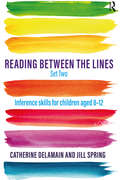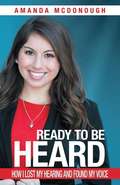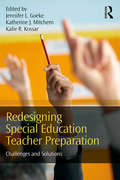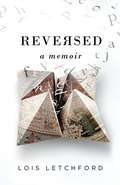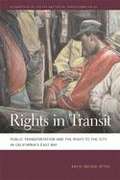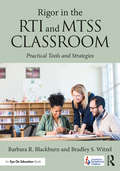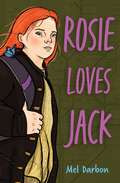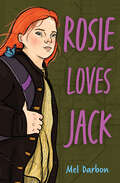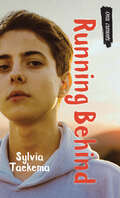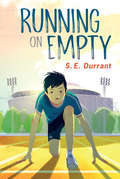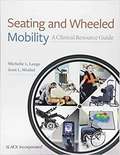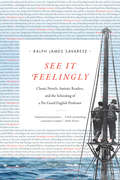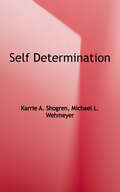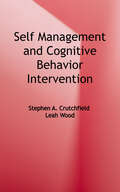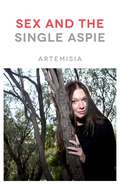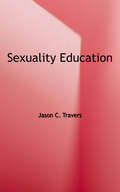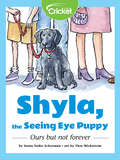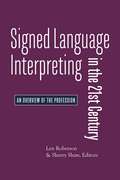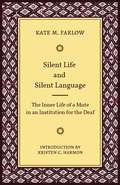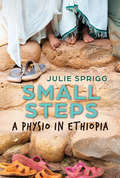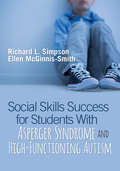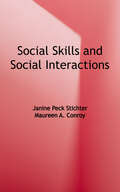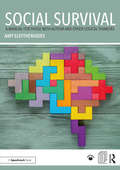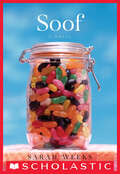- Table View
- List View
Reading Between the Lines Set Two: Inference skills for children aged 8 – 12
by Catherine Delamain Jill SpringReading Between the Lines Set Two is a sequel to the popular Reading Between the Lines. It is a resource book for teachers, teaching assistants, SENCOs and Speech and Language Therapists who need to support the development of inference skills in children aged 8–12. These unique guides offer accessible and easy-to-use material specifically targeted to improve inference, which is a crucial element in understanding spoken and written language. The book provides 370 engaging texts themed around different areas such as place and occupation, and includes short stories about everyday events, magic and adventure. Each short text is accompanied by guiding questions and is carefully graded to allow students to gradually progress from more simple texts with highlighted clues onto more challenging scenarios which will require higher level inferencing skills. Containing handy photocopiable material, this guide can be used with whole classes, small groups or individual children. It will be particularly valuable to professionals working with children who have Autism Spectrum Disorders or Speech, Language and Communication Needs, who need particular support with inference as they develop their broader social communication skills.
Ready To Be Heard: How I Lost My Hearing And Found My Voice
by Amanda McDonoughWhen author Amanda McDonough started losing her hearing at the age of 4 she swore her parents to secrecy. She hid her hearing loss for 18 years from her friends, family, teachers, and acquaintances. As the author grew older, her hearing gradually decreased, causing her to begin struggling in school, in her relationships with family and friends, and with her identity. By age twenty-two, she could no longer rely on her wit to hide her hearing loss. She became one hundred percent deaf in both ears. Amanda found herself unable to hear, talk, lip-read or sign. Her only method of communication with the world was through writing. Ready to be Heard is the story of how Amanda taught herself to speak again, to lip-read, and to sign. McDonough explains how she discovered a new culture, language, and most importantly, herself. In this memoir, the author narrates how she managed to finish college after becoming deaf. How she garnered straight As in school, entered the workforce, enjoyed a successful Hollywood acting career (Freeforms Switched at Birth, ABCs Speechless, NBCs Bad Judge, Google, 7UP, Deaf West/ Pasadena Playhouses Our Town, etc.), fought for her independence, and found her purpose. Ready to be Heard tells about the authors journey to find a balance between the hearing world she was raised in and the Deaf culture to which she now belonged.
Redesigning Special Education Teacher Preparation: Challenges and Solutions
by Jennifer L. Goeke Katherine J. Mitchem Kalie R. KossarRedesigning Special Education Teacher Preparation describes both challenges and possible solutions to redesigning and restructuring high-incidence teacher preparation programs so graduates will meet the Highly Qualified Teacher requirements and be prepared to teach students with high-incidence disabilities. This powerful new text discusses many possible reforms, including field-based teacher preparation, a focus on evidence-based core practices and teacher moves, collaboration with K–12 school-based partners as teacher educators, interdisciplinary collaboration across university faculty, and a grounding in current expectations for high-stakes accountability and program evaluation.
Reversed: A Memoir
by Lois LetchfordIn 1995, the school diagnostician called a seven-year-old “the worst child seen in 20 years of teaching.” Can a child’s fate be sealed by such a diagnosis? Well, in 2018, that boy received a Ph.D. from Oxford University. Do you have a child struggling with reading? What labels has your child been given? How do you feel they will progress through school? This is a story for you. Every parent has high hopes for their children. When Lois Letchford learns her son has been diagnosed with a low IQ at the end of grade one, she refuses to give up on his future. After thorough testing, Nicholas proves to have no spatial awareness, limited concentration, and can only read ten words. Although discouraged, Lois knows things have to improve. After all, her son is young, and every child learns at their own pace. But once Nicholas is labeled "learning disabled," a designation considered more derogatory than "dyslexia," the world of education is quick to cast him aside. Determined to prove them all wrong, Lois temporarily removes her son from the school system and begins working with him one-on-one. She has no formal reading education herself, and no one to guide her. But she has hope and the strength of will to persevere. And sometimes that's all you need. What happens next is a journey—spanning three continents, unique teaching experiments, never-ending battles with the school system, a mother’s discovery of her own learning blocks, and a bond fueled by the desire to rid Nicholas of the “disabled” label. "Reversed" is a memoir of profound determination that follows the highs and lows of overcoming impossible odds, turning one woman into a passionate teacher for children who have been left behind. Nothing is impossible when one digs deep, and looks at students through a new lens.
Rights In Transit: Public Transportation And The Right To The City In California's East Bay
by Kafui Ablode Attoh Mathew Coleman Sapana DoshiIs public transportation a right? Should it be? For those reliant on public transit, the answer is invariably "yes" to both. Indeed, when city officials propose slashing service or raising fares, it is these riders who are often the first to appear at that officials' door demanding their "right" to more service. Rights in Transit starts from the presumption that such riders are justified. For those who lack other means of mobility, transit is a lifeline. It offers access to many of the entitlements we take as essential: food, employment, and democratic public life itself. While accepting transit as a right, this book also suggests that there remains a desperate need to think critically, both about what is meant by a right and about the types of rights at issue when public transportation is threatened. Drawing on a detailed case study of the various struggles that have come to define public transportation in California's East Bay, Rights in Transit offers a direct challenge to contemporary scholarship on transportation equity. Rather than focusing on civil rights alone, Rights in Transit argues for engaging the more radical notion of the right to the city.
Rigor in the RTI and MTSS Classroom: Practical Tools and Strategies
by Barbara R. Blackburn Bradley Steven WitzelIn this new book, bestselling author Barbara R. Blackburn and intervention expert Bradley S. Witzel show you how to develop rigorous RTI and MTSS programs that will support students and lead them to lasting success. Written in a clear, engaging style, Rigor in the RTI and MTSS Classroom combines an in-depth discussion of the issues facing at-risk and learning-disabled students with practical strategies for all teachers. You’ll discover how to: Improve academic and social-emotional performance with scaffolding and demonstration of learning techniques; Establish and teach class rules, expectations, and consequences; Use evidence-based activities to spark student discussion; Implement rigorous, research-based strategies for math, literacy, reading, and writing development; Assess student growth and encourage self-reflection. Form an MTSS leadership team to ensure that student needs are met across building and district levels. Each chapter contains anecdotes from schools across the country as well as a variety of ready-to-use tools and activities. Many of the tools are offered as free eResources at www.routledge.com/9781138193383, so you can easily print and distribute them for classroom use.
Rosie Loves Jack
by Mel DarbonSixteen-year-old Rose Tremayne, who has Down syndrome, attends a program for special-needs students in a London suburb. There she meets Jack, a young man she says "makes the sun shine in my head." Rosie and Jack are devoted to one another, but Jack, who has a traumatic brain injury, has trouble controlling his anger. After he breaks a window in an outburst he is sent to a therapy program in the town of Brighton. Rosie's father seizes the opportunity to end the relationship, but Rose takes matters into her own hands. She sets out on her own to find Jack, leading to a series of harrowing adventures that show her strength and power she never knew she possessed.
Rosie Loves Jack
by Mel DarbonRosie is a sixteen-year-old girl with Down syndrome who's fighting for little freedoms, tolerance, and love."They can't send you away. What will we do? We need us. I stop your angry, Jack. And you make me strong. You make me Rosie."Rosie loves Jack. Jack loves Rosie. So, when they're separated, Rosie will do anything to find the boy who makes the sun shine in her head. Even run away from home. Even struggle across London and travel to Brighton, though the trains are canceled, and the snow is falling. Even though some people might think a girl with Down syndrome could never survive on her own.Introducing a strong, determined, and neurodiverse teen protagonist, debut author Mel Darbon gives readers a unique character experience with a much-needed, alternative point of view. This contemporary young adult novel is a voice-driven, heartfelt story of finding your place in a world that often leaves no room for outsiders.
Running Behind (Orca Currents)
by Sylvia TaekemaEven though he was once his biggest rival, Jake Jarvis is thrilled when Spencer Solomon agrees to join the Diamonds cross-country team to compete in the Barry's Bay provincial championships. Everyone is pumped, everyone is focused, and Jake has to admit, he really likes their chances. At the last moment, Spencer informs the team that he can't go. Jake is furious. But when Spencer explains that he's worried about leaving his wheelchair-bound father alone, Jake gets to work on finding a solution to get Spencer and the Diamonds back on track. This short novel is a high-interest, low-reading level book for middle-grade readers who are building reading skills, want a quick read or say they don’t like to read!
Running on Empty
by S. E. DurrantA boy shoulders great responsibility for his differently abled parents in this touching middle-grade story.CJ is a runner--and when he's running, he's fast, free, and flying. It was Grandad who taught him to run, and who did a lot more, besides. Grandad always made sure things were in order around CJ's house, because his parents could not. CJ's parents are different, and because they do not have the tools to cope with certain elements of everyday life, it was Grandad who reviewed the water bill, saw to it that the electricity meter had funds, and kept everything else shipshape. But now, with Grandad's sudden passing and Aunt Joan about to have a baby, CJ knows it's up to him to make sure Mum and Dad are okay and to keep the household going. It would be a hard job for any adult, but for a kid who's also starting middle-school and trying to impress the gruff track coach . . . is staying afloat even possible? Through its heartwarming and believable characters, Running on Empty sensitively explores the dynamics of a loving family finding its way forward, and the unexpected helping hands that pitch in along the way.
Seating And Wheeled Mobility: A Clinical Resource Guide
by Michelle L. Lange Jean MinkelSeating and Wheeled Mobility: A Clinical Resource Guide presents clinical assessment considerations when working with a person with a disability who may need wheelchair seating for postural support, skin integrity, or a wheelchair base to best meet dependent or independent mobility needs. <p><p> Michelle L. Lange and Jean Minkel have designed this text to support occupational and physical therapists, complex rehabilitation technology suppliers, and even third-party payers who are interested in wheelchair seating and mobility assessment and applications. Seating and Wheeled Mobility provides a wide spectrum of information from foundational information for those practitioners who are new to the field to in-depth, population-specific information for practitioners who perhaps have not worked with a particular population in the past. <p> Seating and Wheeled Mobility: A Clinical Resource Guide provides the depth and breadth of the clinical practice of wheelchair seating and mobility to both those who are new to the field, as well as seasoned professionals.
See It Feelingly: Classic Novels, Autistic Readers, and the Schooling of a No-Good English Professor (Thought in the Act)
by Ralph James Savarese“We each have Skype accounts and use them to discuss [Moby-Dick] face to face. Once a week, we spread the worded whale out in front of us; we dissect its head, eyes, and bones, careful not to hurt or kill it. The Professor and I are not whale hunters. We are not letting the whale die. We are shaping it, letting it swim through the Web with a new and polished look.”—Tito Mukhopadhyay Since the 1940s researchers have been repeating claims about autistic people's limited ability to understand language, to partake in imaginative play, and to generate the complex theory of mind necessary to appreciate literature. In See It Feelingly Ralph James Savarese, an English professor whose son is one of the first nonspeaking autistics to graduate from college, challenges this view. Discussing fictional works over a period of years with readers from across the autism spectrum, Savarese was stunned by the readers' ability to expand his understanding of texts he knew intimately. Their startling insights emerged not only from the way their different bodies and brains lined up with a story but also from their experiences of stigma and exclusion. For Mukhopadhyay Moby-Dick is an allegory of revenge against autism, the frantic quest for a cure. The white whale represents the autist's baffling, because wordless, immersion in the sensory. Computer programmer and cyberpunk author Dora Raymaker skewers the empathetic failings of the bounty hunters in Philip K. Dick's Do Androids Dream of Electric Sheep? Autistics, some studies suggest, offer instruction in embracing the nonhuman. Encountering a short story about a lonely marine biologist in Antarctica, Temple Grandin remembers her past with an uncharacteristic emotional intensity, and she reminds the reader of the myriad ways in which people can relate to fiction. Why must there be a norm? Mixing memoir with current research in autism and cognitive literary studies, Savarese celebrates how literature springs to life through the contrasting responses of unique individuals, while helping people both on and off the spectrum to engage more richly with the world.
Self-Determination
by Michael L. Wehmeyer Karrie Ann ShogrenThis book offers specific and clearly described strategies for teaching learners with ASD to become more self-determined in their actions regarding their educational program plans and outcomes.
Self-Management and Cognitive Behavior Interventions
by Stephen A. Crutchfield Leah WoodSelf-Management and Cognitive Behavior Interventions is a guide to using cognitive behavior modification (CBM) with students with autism spectrum disorder (ASD) to increase the student's self-management. CBM approaches include self-management intervention (SMI) and cognitive behavior intervention (CBI). SMI is synonymous with self-regulation and encompasses a variety of cognitive processes, such as controlling emotions, attending to relevant information, planning future behavior, remaining flexible through unplanned setbacks, and behaving in a way that enhances the likelihood of achieving future goals. SMI is managed by the student and is used to address a wide variety of target behaviors. CBI helps individuals examine their thoughts and emotions and adopt actions that change their thinking as well as their behavior. This book examines specific, research-based cognitive behavior interventions and self-management interventions and explores designing and implementing interventions for students with ASD.
Sex and the Single Aspie
by ArtemisiaThis ground-breaking book about sexuality speaks to women on the autism spectrum in fresh new ways, opening doors to discussion, and blowing the lid off taboo subjects. One of the many problems women on the spectrum face is not always understanding how relationships and boundaries work for other people. This book provides answers, plus more that they may not even have thought to ask. Covering one night stands, the importance of safe sex, self-respect, and double standards, there is a wealth of information about the ethics and self-understanding involved in relationships. Written with humour and honesty, this is the go-to guide for sex on the spectrum.
Sexuality Education (PRO-ED Series on Autism Spectrum Disorders, Second Edition)
by Jason C. Travers"This book promotes the use of a behavior analytic approach and encourages and supports the provision of comprehensive sexuality education (CSE) for healthy and safe sexual development of learners with autism"
Shyla, the Seeing Eye Puppy: Ours But Not Forever
by Susan Yoder AckermanCourtney, her brother Jed, and the whole family must chip in to take care of Shyla, the Labrador retriever puppy, before she is sent to The Seeing Eye to become a guide dog for the blind. Shyla is trained at every opportunity, but the year she stays with Courtney's family goes by fast!
Signed Language Interpreting in the 21st Century: An Overview of the Profession
by Len Roberson Sherry ShawThis text provides interpreting students with a broad knowledge base that encompasses the latest research, addresses current trends and perspectives of the Deaf community, and promotes critical thinking and open dialogue about the working conditions, ethics, boundaries, and competencies needed by a highly qualified interpreter in various settings. This volume expands the resources available to aspiring interpreters, including Deaf interpreters, and incorporates the voices of renowned experts on topics relevant to today’s practitioners. Each chapter provides students with objectives, keywords, and discussion questions. The chapters convey clear information about topics that include credentialing, disposition and aptitude for becoming an interpreter, interpreting for people who are DeafBlind, and working within specialty settings, such as legal and healthcare. A key resource for interpreter certification test preparation, this text follows the interpreter’s ethical, practical, and professional development through a career of lifelong learning and service.
Silent Life and Silent Language: The Inner Life of a Mute in an Institution for the Deaf (Gallaudet Classics Deaf Studie #11)
by Kristen C. Harmon Kate M. FarlowSilent Life and Silent Language presents a fictionalized account of life at a Midwestern residential school for deaf students in the years following the Civil War. Based on the experiences of the author, who became deaf at the age of nine and entered a residential school when she was twelve, this historical work is remarkable and rare because it focuses on signing deaf women’s lives. One of only a few accounts written by deaf women in the 19th century, Silent Life and Silent Language gives a detailed description of daily life and learning at the Indiana Asylum for the Education of the Deaf and Dumb. Kate M. Farlow wrote this book with the goal of giving hearing parents hope that their deaf children would be able to lead happy and productive lives. She sought to raise awareness of the benefits of deaf schools and was an early advocate for the use of American Sign Language and of bilingual education. The Christian influence on the school and on the author is strongly present in her writing and reflects an important component of deaf education at the time. Descriptions of specific signs, games, ASL story nights, and other aspects of the signing community during the 1870s will be of interest to modern students and researchers in linguistics, deaf education, Deaf studies, and Deaf history. Farlow’s work reveals a sophisticated, early understanding of the importance of access to language, education, and community for deaf individuals.
Small Steps: A Physio in Ethiopia
by Julie SpriggThis heartfelt memoir and travel story is about an idealistic young womanforced to confront the limitations of how much difference she can make in acountry rich in culture but stark in its deprivations. Julie Sprigg spent threeyears in Ethiopia, volunteering at a convent clinic and then teaching the firstphysiotherapy cohort to ever graduate from Gondar University. In Ethiopiashe falls in love, and learns as much about herself as she does about thiscomplex, magnificent country and its people.
Social Skills Success for Students With Asperger Syndrome and High-Functioning Autism
by Richard L. Simpson Ellen McGinnis-SmithProvide students the social skills instruction they need to succeed in school and in life! Students on the autism spectrum have so much to offer our schools and communities, but they often aren’t provided with sufficient opportunity to develop to their full potential. This practical resource offers down-to-earth methods and strategies backed by evidence for enhancing the social skills of children and adolescents who have Asperger Disorder and other forms of high-functioning autism. Case studies, vignettes, classroom materials, checklists, and templates will help you: Deliver interventions that model desirable behaviors and provide opportunities for students to practice Support students in navigating social situations, forming relationships with peers and adults, and following rules and routines Develop, implement, and evaluate social skills intervention and support programs Educators and specialists will appreciate how this practical and friendly resource approaches each student as a unique learner and offers ways to build multi-faceted social skill intervention and support plans for each one. "Packed with practical, research-based activities, this book is the answer for teachers and parents. Educators will find value in the detailed processes and activities as well as the ready-to-use materials." —Renee Bernhardt, Supervisor of Special Education Cherokee County School District, Canton, GA "This is an up-to-date, practical, and practitioner-friendly resource for developing, implementing, and evaluating social skill intervention and support programs." —Debi Gartland, Professor of Special Education Towson University
Social Skills Success for Students With Asperger Syndrome and High-Functioning Autism
by Richard L. Simpson Ellen McGinnis-SmithProvide students the social skills instruction they need to succeed in school and in life! Students on the autism spectrum have so much to offer our schools and communities, but they often aren’t provided with sufficient opportunity to develop to their full potential. This practical resource offers down-to-earth methods and strategies backed by evidence for enhancing the social skills of children and adolescents who have Asperger Disorder and other forms of high-functioning autism. Case studies, vignettes, classroom materials, checklists, and templates will help you: Deliver interventions that model desirable behaviors and provide opportunities for students to practice Support students in navigating social situations, forming relationships with peers and adults, and following rules and routines Develop, implement, and evaluate social skills intervention and support programs Educators and specialists will appreciate how this practical and friendly resource approaches each student as a unique learner and offers ways to build multi-faceted social skill intervention and support plans for each one. "Packed with practical, research-based activities, this book is the answer for teachers and parents. Educators will find value in the detailed processes and activities as well as the ready-to-use materials." —Renee Bernhardt, Supervisor of Special Education Cherokee County School District, Canton, GA "This is an up-to-date, practical, and practitioner-friendly resource for developing, implementing, and evaluating social skill intervention and support programs." —Debi Gartland, Professor of Special Education Towson University
Social Skills and Social Interactions
by Maureen A. Conroy Janine Peck StichterSocial Skills and Social Interactions is written to enhance the quality and quantity of social interactions of individuals with autism spectrum disorder (ASD) and their peers. The text describes social competence and peer-related social behaviors, a multisource functional approach to assessment, and evidence-based practices for fostering peer-related social interactions. This book provides a systematic process for educators to assess, plan for, and support students' social behaviors with peers in the classroom.
Social Survival: A Manual for those with Autism and Other Logical Thinkers
by Amy EleftheriadesSocial Survival is a practical manual outlining what it means to be a logical thinker and how logical thinkers can make sense of the social world. Relevant for young logical thinkers including those with high-functioning autism and Asperger’s syndrome, this book clearly outlines how social confusion might arise and how this can be overcome. Written in a clear and unpatronising style, the book considers a range of different social scenarios and breaks these down into manageable components with helpful activities to be completed by the young person. Chapters discuss the nature and benefits of logical thinking, nuances of language and communication in social situtations, and the intricacies of social etiquette and peer interaction. Features include: appealing visual resources; practical activities around social situations that are relevant to young people; blank templates which can be photocopied and are available for download online; guidance for family members on how to encourage ongoing communication; an action plan which can be personalised for different scenarios. Social Survival will be essential reading for health, social care and education professionals and parents working with those who have high functioning autism or Asperger’s syndrome or those who are logical thinkers who do not have a diagnosis. In addition, this book can be used independently by the young person themselves.
Soof: A Novel
by Sarah WeeksIn this stand-alone follow-up to So B. It (now a major motion picture), a girl who the world might see as weird finds her footing and stands her ground.All her life, Aurora has heard stories about Heidi and all the good luck she brought Aurora’s family. Aurora, though, doesn’t feel very lucky. The kids at school think she’s weird. And she’s starting to think her mom thinks she’s weird, too. Especially compared to Heidi.On the eve of a visit from Heidi, more bad luck hits Aurora’s family. There’s a fire in their attic, destroying a good part of their house. And, even worse, Aurora’s beloved dog goes missing. Aurora and her family have always believed in soof—Heidi’s mom’s word for love. But sometimes even when soof is right there in front of you, you still need to find it—and that’s exactly what Aurora is going to do.“A moving exploration of family, love, and forgiveness.” —The Horn Book“A sweet story that shows all you need is soof.” —Kirkus Reviews
